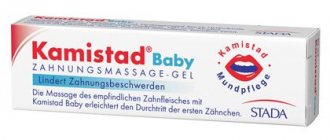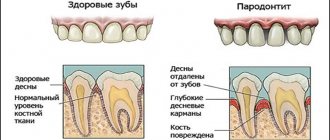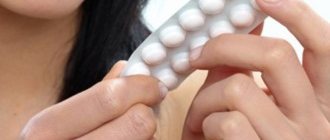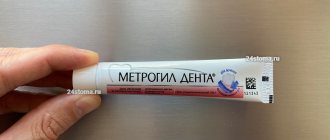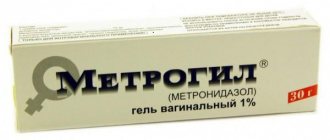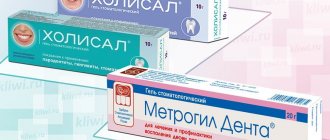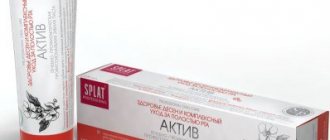Write a review
Reviews: 0
Manufacturers: Unique Equipments
Active ingredients
- Metronidazole
- Chlorhexidine
Disease class
- Diseases of the pulp and periapical tissues
- Periapical abscess without cavity
- Acute gingivitis
- Chronic gingivitis
- Acute pericoronitis
- Chronic periodontitis
- Periodontal disease
- Periodontal disease, unspecified
- Alveolitis of the jaws
- Recurrent oral aphthae
- Lip diseases
- Other and unspecified lesions of the oral mucosa
- Presence of dentures
Clinical and pharmacological group
- Not indicated. See instructions
Pharmacological action
- Antibacterial
- Antiseptic (disinfectant)
- Bactericidal
Pharmacological group
- Other synthetic antibacterial agents in combinations
- Dental products in combinations
Gel Metrogyl Denta
Instructions for medical use of the drug
Description of pharmacological action
It has an antibacterial effect against anaerobic bacteria that cause periodontal diseases: Porphyromonas gingivalis, Prevotella intermedia, Fusobacterium fusiformis, Wolinella recta, Eikenella corrodens, Borrelia vincenti, Bacteroides melaninogenicus, Selenomonas spp.
Indications for use
Infectious and inflammatory diseases of periodontal and oral mucosa: - acute and chronic gingivitis; — acute ulcerative-necrotizing gingivitis of Vincent; — acute and chronic periodontitis; — juvenile periodontitis; - periodontal disease complicated by gingivitis; - aphthous stomatitis; - cheilitis; - inflammation of the oral mucosa when wearing dentures; — post-extraction alveolitis (inflammation of the socket after tooth extraction); - periodontitis, periodontal abscess (as part of combination therapy).
Release form
gel for use in dentistry; plastic tube of 5,10,20,30 or 50 g, cardboard pack 1; gel for use in dentistry; aluminum tube of 5,10,20,30 or 50 g, cardboard pack 1;
Pharmacodynamics
The effectiveness of the drug is due to the presence of two antibacterial components in its composition: a) metronidazole has an antibacterial effect against anaerobic bacteria that cause periodontal diseases: Porphyromonas gingivalis, Prevotella intermedia, Fusobacterium fusiformis, Wolinella recta, Eikenella corrodens, Borrelia vincenti, Bacteroides melaninogenicus, Selenomonas spp. b) chlorhexidine is a broad-spectrum antiseptic that has a bactericidal effect against vegetative forms of gram-negative and gram-positive microorganisms, as well as yeast, dermatophytes and lipophilic viruses.
Pharmacokinetics
When applied topically, Metrogyl Denta gel is practically not absorbed.
Use during pregnancy
It is not recommended to prescribe the drug to pregnant women in the first trimester of pregnancy. During lactation, the issue of stopping breastfeeding should be decided.
Contraindications for use
individual intolerance to metronidazole, chlorhexidine, as well as nitroimidazole derivatives and any components included in the drug; children under 6 years of age.
Side effects
When using Metrogyl Denta gel topically, the risk of developing systemic side effects is low, but sometimes the following may occur: headache, allergic reactions (skin rash, itching, urticaria).
Directions for use and doses
Topically, for dental use only. For adults and children over 6 years old with gum inflammation (gingivitis), Metrogyl Denta is applied to the gum area 2 times a day; it is not recommended to wash off the gel. The duration of treatment is on average 7–10 days. After applying the gel, you should refrain from drinking and eating for 30 minutes. In case of periodontitis, after removing dental plaque, periodontal pockets are treated with Metrogyl Denta gel and the gel is applied to the gum area. Exposure time - 30 minutes. The number of procedures depends on the severity of the disease. In the future, the patient can apply the gel independently: Metrogyl Denta is applied to the gum area 2 times a day for 7–10 days. For aphthous stomatitis, Metrogyl Denta is applied to the affected area of the oral mucosa 2 times a day for 7–10 days. To prevent exacerbations of chronic gingivitis and periodontitis, Metrogyl Denta gel is applied to the gum area 2 times a day for 7–10 days. Preventive courses of treatment are carried out 2–3 times a year. To prevent post-extraction alveolitis after tooth extraction, the hole is treated with Metrogyl Denta® gel, then the gel is applied on an outpatient basis 2-3 times a day for 7-10 days.
Overdose
There were no cases of drug overdose with topical use.
Interactions with other drugs
When applied topically in recommended doses, no systemic interaction of Metrogyl Denta gel with other drugs was detected.
Special instructions for use
The use of Metrogyl Denta gel does not replace hygienic brushing of teeth, therefore, during the course of treatment with the drug, teeth brushing should be continued.
Storage conditions
List B.: At a temperature not exceeding 25 °C.
Best before date
36 months
ATX classification:
A Digestive tract and metabolism
A01 Dental preparations
A01A Dental preparations
A01AB Antimicrobials for topical use in diseases of the oral cavity
A01AB11 Other antimicrobials
Surgical method of treatment
One of the most expensive, but no less effective methods of treatment is surgery. With the help of certain materials and special membranes that are planted under the gum, bone tissue growth is achieved. As a result of a productive course of treatment, it is possible to achieve the creation of an alveolar process, with the help of which it is possible to fix loose teeth. To restore gums, several types of cells are used: fibroblasts (accelerate the production of collagen, which improves tissue elasticity and increases the protective properties of the oral mucosa), stem cells (produce new mucosal tissue), and platelet growth factors (protein compounds to strengthen and restore blood vessels blood and lymph).
Similar drugs:
- Augmentin Oral tablets
- Tea tree DN Ointment for external use
- Augmentin Powder for suspension for oral administration
- Bactrim Oral suspension
- Dioxydin Mouth rinse solution
- Pancef Oral tablets
- Nifuroxazide (Nifuroxazide) Oral tablets
- Cifran OD Oral tablets
- Pancef Granules for the preparation of suspension for oral administration
- Augmentin ES Powder for oral solution
** The Drug Directory is intended for informational purposes only. For more complete information, please refer to the manufacturer's instructions. Do not self-medicate; Before starting to use the drug Metrogyl Denta, you should consult a doctor. EUROLAB is not responsible for the consequences caused by the use of information posted on the portal. Any information on the site does not replace medical advice and cannot serve as a guarantee of the positive effect of the drug.
Are you interested in the drug Metrogyl Denta? Do you want to know more detailed information or do you need a doctor's examination? Or do you need an inspection? You can make an appointment with a doctor - the Euro lab is always at your service! The best doctors will examine you, advise you, provide the necessary assistance and make a diagnosis. You can also call a doctor at home . Euro lab clinic is open for you around the clock.
** Attention! The information presented in this medication guide is intended for medical professionals and should not be used as a basis for self-medication. The description of the drug Metrogyl Denta is provided for informational purposes and is not intended for prescribing treatment without the participation of a doctor. Patients need to consult a specialist!
If you are interested in any other drugs and medications, their descriptions and instructions for use, information about the composition and form of release, indications for use and side effects, methods of use, prices and reviews of drugs, or you have any other questions and suggestions - write to us, we will definitely try to help you.
Causes
The development of gingivitis in pregnant women may be associated with changes in hormonal levels, which are characterized by:
| increased concentrations of estrogens, progesterone, prostaglandins | the appearance of toxicosis |
However, hormonal changes usually only predispose to the occurrence of gingivitis, and its actual causes are as follows:
- accumulation of soft plaque due to poor oral hygiene;
- exacerbation of sluggish chronic gingivitis during pregnancy.
Up to contents
Are there any restrictions during pregnancy?
Tooth extraction is rarely performed during pregnancy - only in cases where there are emergency indications that threaten the course of pregnancy and the health of the woman and fetus. If the doctor believes that removal cannot be avoided, it is very important to follow all the specialist’s recommendations in the postoperative period, even if the expectant mother feels well. The natural decrease in immunity during pregnancy contributes to the rapid growth of pathogenic flora in case of penetration of bacteria and microbes into the oral cavity, therefore it is important to provide antiseptic treatment with the help of drugs prescribed by a doctor.
The official instructions indicate the first trimester of pregnancy as a contraindication for use, but in rare cases, the doctor may prescribe this remedy in the early stages of pregnancy (up to 12-14 weeks). It is important to follow the indicated dosages and number of uses per day. In the 2nd and 3rd trimesters, the use of the gel is safe and does not affect the condition and growth of the fetus due to the low absorption of the active ingredients.
Important! At any stage of pregnancy, before using Metrogyl Denta, it is better to consult a doctor. Women who are breastfeeding must stop lactation for the period of treatment.
Does smoking affect the effectiveness of use?
Dentists note that about 50% of patients seeking dental care suffer from tobacco addiction. Smoking negatively affects the condition of the mucous membranes, reduces local immunity and causes irritation of the gums. Tobacco smoke interferes with the healing of the hole after extraction and can become one of the factors provoking postoperative complications, so doctors recommend stopping (or at least reducing the number of cigarettes smoked) during the recovery period after surgery.
Important! Smoking is not a contraindication for the use of Metrogyl Denta, but it significantly reduces the effectiveness of therapy, preventing rapid healing of the socket and tissue regeneration.
What to do in case of accidental ingestion?
This situation is typical mainly for pediatric patients, so children should use the gel strictly under adult supervision. If a small amount of the drug is accidentally ingested, no significant changes in well-being are usually observed.
When consuming large doses of the gel, signs of drug poisoning are possible, which include:
- dizziness and headache;
- nausea;
- vomiting;
- convulsive syndrome;
- tremor of the upper and lower extremities;
- paresthesia (disturbances in the functioning of sensory receptors, manifested by numbness, tingling, sensation of “pins and needles”).
If these symptoms appear, you should seek medical help. Treatment begins with copious gastric lavage with warm saline solution. If necessary, symptomatic therapy is prescribed, which may include the drugs listed in the table below.
Table. Symptomatic treatment regimen for accidental gel poisoning.
| Group of drugs | Drugs used |
| Sorbents and medications to eliminate intoxication | "Filtrum-sti", "Polysorb", "Neosmectin", "Enterosgel" |
| Rehydration agents (for profuse and repeated vomiting to restore water and mineral balance) | "Regidron" (powder for preparing saline solution) |
| Prebiotics and lactic acid bacteria (if necessary) | "Acipol", "Normobakt", "Bifidumbacterin" |
Important! Any of the listed medications can be used only if there are absolute indications after consultation with a doctor.
Metrogyl Denta is one of the most popular dental drugs that can be prescribed for the treatment and prevention of infectious lesions and inflammatory processes in the oral cavity. After tooth extraction, the product disinfects the socket, prevents the growth of bacterial flora, and helps quickly cope with pain and signs of gum inflammation at the extraction site. Before use, it is recommended to consult a doctor, as the gel has contraindications.
